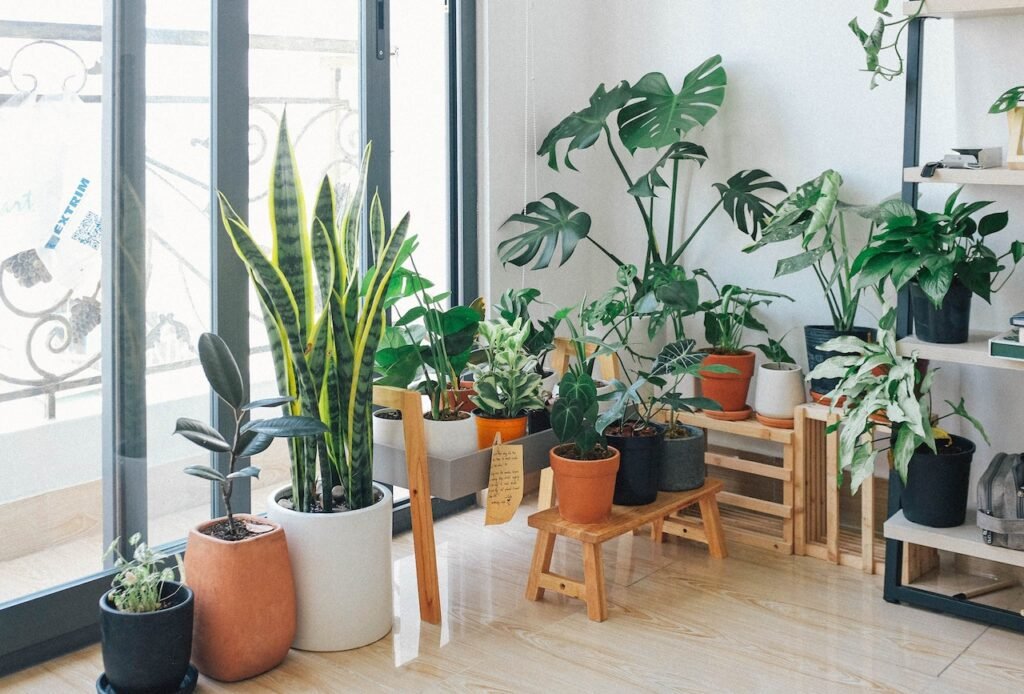Anyone who has been around a lot of greens is fully aware of their benefits to your overall health. Plants can not only brighten your surroundings but also lift your mood. From acting as solutions to various health problems to being a mood booster, these green wonders can help soothe digestive issues, ease your anxiety levels, and heal your burns.
Different plants have different properties that make them useful on many levels. Whether it is a flowering plant, a moss or a vascular plant, plants play multiple roles in food, medicines, non-food products and aesthetic pleasure.
Science proves that interacting with plants indoors and outdoors is good for one’s physical and mental health. Regardless of age, planting some in your garden or keeping some on your desk can reap benefits. In recent years, there has been a sudden rise in the number of people turning to plants for comfort and relaxation, placing them on our office desks and hanging them over our beds.
Mental health benefits of houseplants
Studies show that interacting with nature is critical to maintaining a sense of well-being. Surrounding yourself with the right types of plants can help you reap a wide range of psychological benefits. The followings are the different ways plants can improve your mental health.
1. Relieves stress and anxiety
Various studies have shown that plants can reduce stress and anxiety and promote a better sleep cycle. According to research conducted by researchers at Kansas State University, adding plants to rooms has been shown to have a positive effect on the recovery rate of patients, especially in hospital rooms. The study compared patients in rooms with plants and those without and found that patients in rooms with plants had less fatigue and anxiety.
Keeping lavender in your room can cure restlessness, restlessness, anxiety and insomnia. According to a study published in the Journal of Physiological Anthropology, a workspace with plants can help reduce mental and emotional stress. Indoor gardening helps reduce cortisol levels, which helps one control anxiety and stress levels.
2. Improves mood
Plants make us happy, there’s no denying that. Studies show that plants can help you feel calmer and more relaxed. A survey of four San Francisco Bay Area hospitals found that when interacting with plants, 79 per cent of patients said they felt calmer and calmer, 19 per cent felt more positive, and 25 per cent felt refreshed and stronger.
Flowering houseplants help generate positive emotions and, in older people, have been shown to improve their episodic memory.
3. Improves Attention Span
Being surrounded by plants and having plants in your room has been shown to improve a person’s focus, which in turn helps with concentration and learning. A study at the Royal Agricultural College in Cirencester, England, found that students showed a 70 per cent increase in their comprehension and learning levels when they were taught with plants in classrooms.
Another study found that plants have a positive effect on children with attention deficit hyperactivity disorder (ADHD). That is, when surrounded by plants in their rooms – children focused more easily and better compared to any other setting.
4. Boosts Self-esteem
Caring for a plant and watching its transformation has been proven to have a positive effect on children and adults alike. According to a study, the growth and transformation process of the plant cared for by the person does not refer to the external appearance and related factors to its own growth, but it is consistent with the fact of proper nutrition and care. It contributes to this and in turn, helps to boost one’s self-esteem.
5. Improves Air Quality
Many studies have shown the benefits of plants in air purification. Indoor plants help promote air quality in your rooms and home. Air pollution levels inside your own home or office are often higher than outside levels. It can cause sick building syndromes, which include symptoms such as headache, dizziness, loss of concentration and throat irritation.
Studies have shown that houseplants help remove over 300 toxic substances from indoor air known as volatile organic compounds. Plants are able to remove 87 per cent of volatile organic compounds (VOC) every 24 hours. Studies have shown that for a 1,800-square-foot home, 15-18 plants can be placed in 6-8 inch diameter pots and use air-purifying properties.
6. Eating Healthy Foods
Indoor vegetable gardening is considered a direct way to promote healthy eating habits. Vegetables and herbs such as scallions, radishes, baby kale, arugula, rosemary, cilantro, chives, thyme, chives, potatoes, potatoes, spinach, tomatoes and strawberries can be grown indoors. With the help of a pot with drainage holes and specially designed indoor potting soil, you can easily create your indoor kitchen.
This practice has been proven to promote the addition of healthy foods to people’s diets and break bad eating habits. Apart from that one does not have to worry about the side effects of pesticides. According to research from Saint Louis University, when families grow food, they create a positive food environment. It was found that children who consumed home-cooked meals had more than twice the daily intake of vegetables and fruits.
7. Reduces the risk of Disease
Another major benefit of indoor plants is that they help increase the comfort level of rooms and reduce the risk of illness. Indoor plants can help reduce illness by improving indoor air quality and promoting healthy eating habits.
According to a study, plants help add humidity to a room, which can reduce or control dust levels in the air. Plants help reduce the risk of irritating airways, runny nose and itchy eyes.
On a final note,
Having green leafy plants in your room has been linked to various health benefits. It is also said to improve one’s creative thinking. Indoor, potted plants are good for our mental and physical well-being. Don’t wait, Get some greens!

